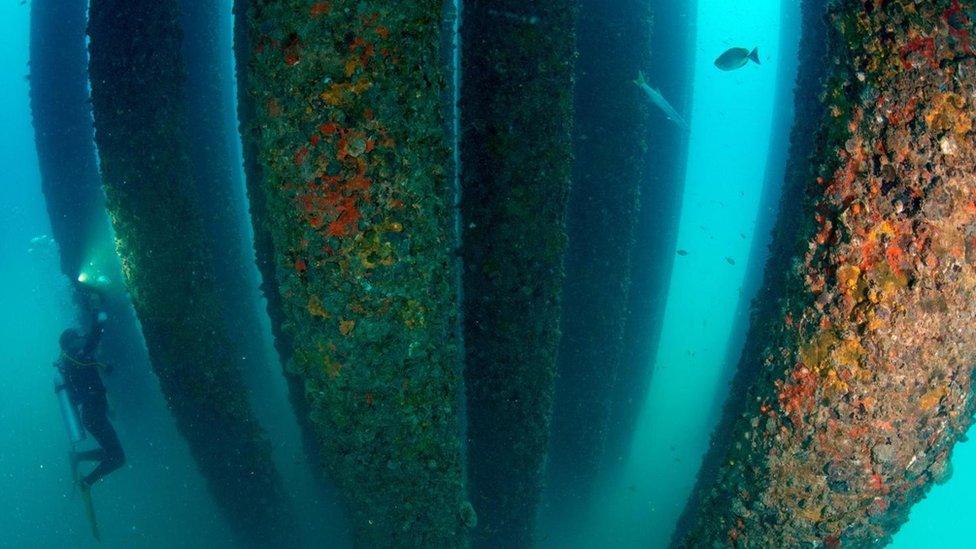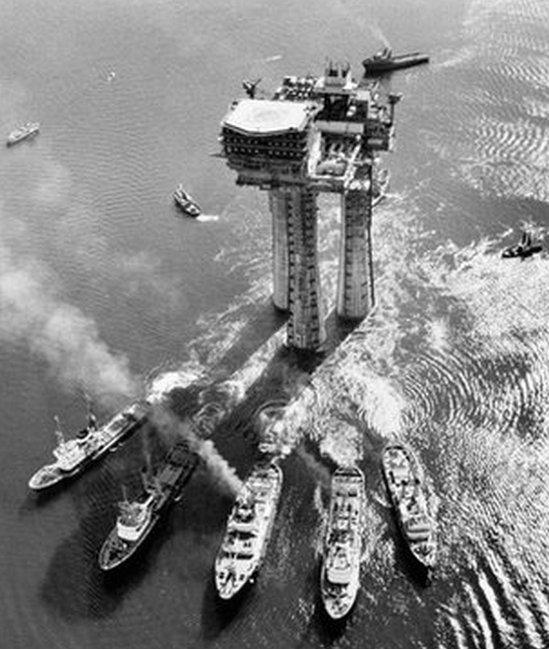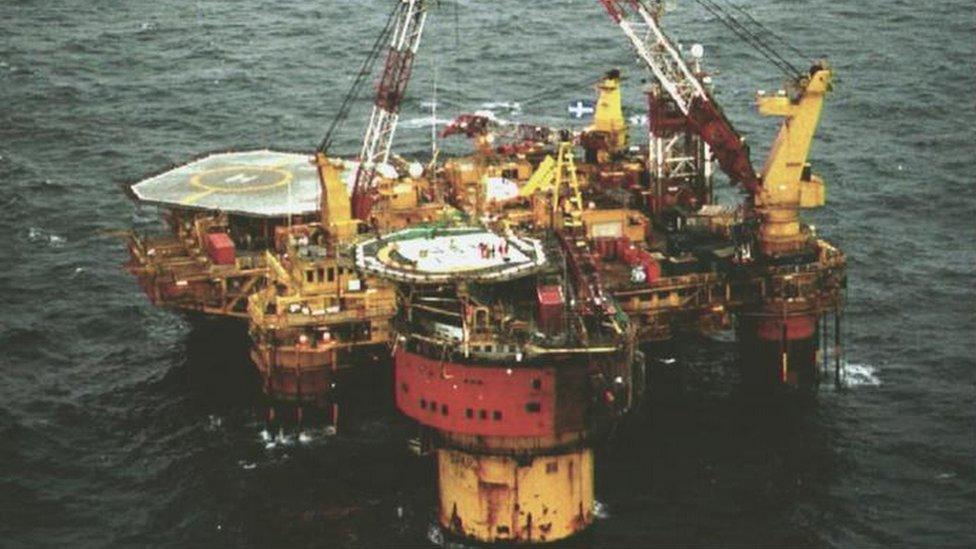Ageing North Sea oil: Investing in long-term care costs
- Published

Breaking up an oil platform is an extremely complex job
There's life in the North Sea yet, though it may not be as we know it.
New finds of oil and gas are rare, at least in the UK sector. Statoil has just found another reservoir in Norwegian waters, of between 20m and 50m barrels, where it has had some notable successes close to the British boundary.
Things have sparked up in deal-making, with Shell offloading around half its production capacity, to focus on big new developments.
Israeli energy firm Delek this week moved in on Ithaca Energy, based in Aberdeen and listed in Toronto. It already had a 20% stake.
The takeover offer - which directors like, but some shareholders don't - values the company behind the central North Sea Stella development, which is soon to come on stream, at more than half a billion pounds.
Delek is also the biggest shareholder in Faroe Petroleum, one of the most active independents in the North Sea. As the Israel-based firm is on a spending spree, backed by big gas finds in the eastern Mediterranean, it may want to push for more than 13% of Faroe too.
Such asset sales tell you something - that there are buyers to be found. That's obvious, but not guaranteed if the finances don't look right. It seems there's more money to be made, even from mature fields.

An oil platform being transported from Stavanger in Norway to the Brent oil and gas field in 1975
It helps that the price of Brent crude has stabilised at around $55 per barrel in the past two months. The industry can live with that, having cut its costs substantially.
Also, such deals are an indication that foreign oil companies aiming at new subsea developments around the world - based in Israel, China, Korea, Qatar - reckon there's quite a bit to be learned from having a stake in the North Sea.
It also tells you that the prospect of decommissioning all those platforms and pipelines when they are no longer usable is financially manageable for new buyers.
Liability is often shared with the seller, and the Treasury has made some moves to clarify the complex tax position for decommissioning.
That's just as well for the nascent industry of breaking up equipment and capping wells. Last year, it's reckoned that £1.1bn was spent in the North Sea, much of that with the smaller, more southerly gas fields that were first to be developed.
Offshore kit
This year, that could rise close to £2bn. Over the next 40 years, the bill is put at somewhere between £30bn and £50bn, depending how the costs and technology develop.
The costs could come in quite a bit lower if oil companies are allowed to leave large bits of equipment in the North Sea. Shell hopes to do that with three concrete storage bases on the seabed of the Brent field, publishing its plans on Wednesday for a two month consultation.
It's 22 years since the British-Dutch energy giant was badly stung by the Brent Spar campaign, run by Greenpeace to stop the ocean dumping of a particularly dirty bit of offshore kit. The industry learned from that. It can't afford to make that reputational error again.
That's why the Brent field decommissioning has taken 11 years of planning so far, with 300 studies carried out. Shell has been consulting widely, including talks with fishermen who may prefer to be left with visible hazards than the kind they can't see, under the water.

Greenpeace carried out a high-profile campaign against plans to dump the Brent Spar platform in 1995
With four platforms, one of them still producing, the Brent decom project is not the start of this process, but it is a major step up in the pace.
It has been noted that contracts for breaking up platforms and jackets have not been coming to Scottish yards, but to Tees-side specialists and foreign firms, including in Norway.
It's clear this industry requires a specialised supply chain, and there is a risk that Scotland will lose out if it doesn't get its act together with a bit of co-ordination.
Aberdeen postcode
The Scottish government, with its agency, Scottish Enterprise, is now on the case, even though the decom process serves to underline the inevitable decline of an industry that has been very important to the SNP cause.
It emphasises that much of the spending is not on projects that we can see. Taking an oxyacetylene torch to a vast steel jacket looks impressive, but far more work is being put into both planning and capping subsea wells. Much of that work, it is claimed, is being done by people with an Aberdeen postcode.
The numbers coming from the industry suggest that the cost of plugging and abandoning 5000 wells in the North Sea will run to around 47% of the decommissioning total. That's while removal of structures - the visible bit - looks like 19% of the cost.
The numbers can look a bit boggling, with 302 oil and gas installations, and 16,000 kilometres of pipelines:
241 small steel platforms
31 large platforms with jackets weighing more than 10,000 tonnes
19 floating production ships
8 gravity-based platforms
3 jack-up platforms
Even by 2025, the projected figures are daunting:
153 projects, including 1,470 wells and 95 platforms
895,000 tonnes of equipment coming onshore, of which 540,000 tonnes is from platform top sides and 63,000 tonnes is subsea.
Behind that is much new technology and expertise which can then be exported around the world as other offshore oil and gas basins mature.
The Aberdeen-based industry has proven very effective at shifting from a dependence on the North Sea to exporting of its subsea know-how.
One warning worth noting this week from consultancy Douglas-Westwood is that the "golden triangle" of big new offshore fields - from Brazil to the Gulf of Mexico to West Africa - may be running out of momentum.
That low oil price, and political problems in Brazil and Venezuela, have seen far few big projects getting the green light. For those dependent on exports, that should be an amber warning.